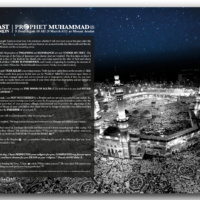Laa ilaha ilAllaah
Q: Does mere pronouncement of Shahadah (Testimony of Faith) suffice for a person to be rightfully called a Muslim, or does one have to do other things in order for their Islam and Iman (faith) to be complete?
A: It is enough for a non-Muslim to pronounce the first pillar of Islam, that is, to bear witness that La ilaha illa Allah (there is no deity but Allah) and Muhammad is the Messenger of Allah to be rightfully called a Muslim provided that this testimony is pronounced out of one?s certainty, knowledge, true belief, and sincere work. A person will then be asked to perform Salah (Prayer) and observe other acts of `Ibadah (worship). When the Prophet (peace be upon him) sent Mu`adh (may Allah be pleased with him) to Yemen, he said: Invite them to bear witness that La ilaha illa Allah and Muhammad is the Messenger of Allah. If they do that, then inform them that Allah has made it obligatory upon them to offer the Five Obligatory Daily Prayers. If they obey, then inform them that Allah has made it obligatory upon them to pay Zakah (obligatory charity) which is taken from the rich among them and distributed among the poor. The Prophet (peace be upon him) did not ask Mu`adh to command them to offer Salah until their Tawhid (monotheism) and Iman in the Messenger of Allah (peace be upon him) were firmly established. First of all, they are required to declare the Oneness of Allah and believe in Muhammad as the Messenger of Allah. Once they embrace Islam, the former Kafir (disbeliever) will hold the same rulings applied to Muslims. Then they will be required to offer Salah and perform all other religious acts. If they refrain from performing these acts, other rulings will be applicable to them.
For example, if they abstain from offering Salah, they are given the chance to offer Tawbah (repentance). Otherwise, the Muslim ruler may punish him by capital punishment. If they arrogantly refuse to pay or and fight for that, they will also be fought. This is based on the fact that the Sahabah (Companions of the Prophet Muhammad) fought those who denied Zakah. If they deny Sawm (fast), the Imam (ruler) may inflict Ta`zir (discretionary punishment) on them in a way that serves as a deterrent for them. The same applies to abstention of performing Hajj in case a person is financially and physically capable of performing it. This ruling is applicable to all sins which are liable to Ta`zir or Had (ordained punishment for violating Allah's Law). In conclusion, a person will be considered as having embraced Islam once they declare Shahadah whereby they will be treated as Muslims. If they die soon after declaring Shahadah, they will dwell in Jannah (Paradise). For example, if they embrace Islam after sunrise and die before they can offer the Zhuhr (Noon) Prayer, they will be regarded as Muslims though they have not performed any Salah. This was the case with some of the Sahabah who were killed on the battlefield soon after they embraced Islam. They belong to the dwellers of Jannah, even though they did nothing except having declared Allah's Oneness and believed in the Messenger of Allah. However, if they live until the time of Salah is due, they will be commanded to offer it. If they amass wealth which reaches Nisab (the minimum amount on which Zakah is due), they will be commanded to pay Zakah. They will also be required to observe Sawm if they witness the month of Ramadan. They will also be obliged to perform Hajj if they have the means. In general, they will hold the same rulings applied to Muslims whether those related to this life or the Hereafter. They will be obliged to fulfill all the duties of Islam. However, if they die before the time of Salah has become due, they will be regarded as Muslims and shall be consigned to Jannah. In case of their persistent refusal to offer Salah, they will be treated as Kafirs. This is the view held by a large number of scholars. Other scholars hold that they will be considered as having committed minor Kufr (disbelief that is not tantamount to taking the Muslim out of Islam). Although they will have to be put to death, they will not be considered as having committed major Shirk (disbelief that takes the Muslim out of Islam). The same applies to abandoning Zakah or Sawm. The correct opinion is that whenever a person abandons Salah intentionally, they are regarded as having denied its obligatory status. Accordingly, they will be executed according to the correct view maintained by scholars. The majority of Fuqaha' (Muslim jurists) hold the view that they will be considered disobedient Muslims. This is the view held by the majority of later Fuqaha'. However, `Abdullah ibn Shaqiq Al-`Uqaily reported that the Companions were unanimous on the fact that whoever abandons Salah will be considered as having committed Kufr.
Source: http://alifta.net/Fatawa/FatawaSubjects.aspx?languagename=en&View=Page&HajjEntryID=0&HajjEntryName=&RamadanEntryID=0&RamadanEntryName=&NodeID=2304&PageID=15&SectionID=8&SubjectPageTitlesID=15447&MarkIndex=0&0
Only logged in customers who have purchased this product may leave a review.









Reviews
There are no reviews yet.